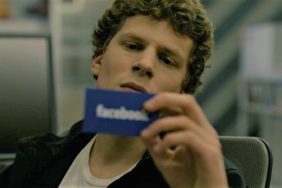Sundance buzz can be a mixed bag. Of course it propels breakout hits, but sometimes it can prejudge a film before it’s ready. I’ve heard about films showing rough cuts at Sundance only to be improved dramatically upon their ultimate release. That’s kind of their own fault for rushing a film into competition/exhibition before it’s ready. I don’t know if they’ve made any changes to Jobs since Sundance (except changing the spelling from jOBS), but I think the lukewarm to negative buzz it got is unfortunate, perhaps even unfair.
Sure, a high profile biopic starring a high profile celebrity is going to have to bear scrutiny, but I think Jobs creates a powerful narrative in Steve Jobs’ life and conveys the profound value of innovation, including the cost of such a drive. I think the worst I can say about Jobs is that it’s not The Social Network, and if not being The Social Network is the worst thing about your film then you’re in pretty good shape.
The film begins in 2001 as Jobs (Ashton Kutcher) introduces the iPod to his staff. It is a great introduction that begins in a long shot, easing us into Kutcher as Jobs. We can see Kutcher is capturing Jobs’ essence, not an impersonation, although it is a great makeup job to turn him into 2001 era Jobs.

But the real story is how Jobs rejected institutional learning and the corporate workplace to create revolutionary innovations on his own. Right now, we take it for granted that our typing shows up on a computer screen. That was revolutionary in the ‘70s. They were programming and not even seeing their work! Jobs took a project from Atari, started producing his own computer products with a team in his garage, eventually designed the Apple II and took his company public, but his often unscrupulous practices would create conflicts with his partners.
The script sometimes makes Jobs’ personality quirks simplistic, and it’s a touch heavy handed when the music swells upon the revelation that he’s cheating on his girlfriend. It spells out his social conflicts with colleagues when a boss at Atari even says he has to learn to work with people. The Atari boss also flat out says Jobs is an asshole, which is a kind of workplace bluntness I find refreshing. Jobs himself muses “I just can’t work for other people” but at least he doesn’t mince words. Jobs is also forced to wear shoes and take showers. I think we can all agree adultery is bad, but bad hygiene may be a flaw whose significance we underestimate. Kutcher’s barefoot portrayal of Jobs will also make this a major foot fetish movie.
The film illustrates how innovation alone isn’t enough to change the world. Jobs and Steve Wozniak (Josh Gad) came up with a computer board that will display on a screen, but that’s useless without the keyboard and monitor included. However, Jobs takes a misunderstanding as inspiration to perfect the next step, the all-in-one personal computer. We hear that his big ideas for personal computers, including the Macintosh, are costing Apple more than they will make back. Of course we know that the Macintosh becomes a huge success, so it’s easy to think those corporate moneymen were wrong. It’s not okay to just blow other people’s money on your whims, and Jobs had been wrong before about the Lisa computer. It illustrates the delicate balance between innovation and irresponsibility.

Of course there was more to Steve Jobs and the history of Apple computers than the chronological events presented in this film. The important point is that these discoveries and conflicts illustrate the kind of decisions Jobs made, good and bad, and the kind of company he created. The completion of the story isn’t whether or not Jobs retained his company from a hostile board, or when he invented the iPhone or even if the film followed him until his death in 2011. (The film does not address the latter two events.) The victory of Jobs’ narrative is that his spirit of innovation survived all the corporate politics and ego, including Jobs’ own ego. There were people at Apple long after Jobs’ departure who were inspired by him, and there will be people who build on his work long after his death. That is the story of Jobs.
You also see the arcs of supporting characters. Particularly John Sculley (Matthew Modine), who Jobs hires to market the Macintosh. He enters the movie as a hotshot with big ideas, becomes an adversary to Jobs and leaves the film as a disgraced villain. Sorry for the spoiler, but you know Steve Jobs is the hero in this, and you know that John Sculley didn’t become the leader of the tech revolution. That is an example of a good adaptation, giving both big picture and small picture narratives a micro and macro significance. There are quite a few company pep rallies with crowds cheering Jobs’ latest invention. It is perhaps a cinematic shorthand, but as a visual metaphor, that also illustrates how the public reacted, gobbling up iPods and personal computers, let alone making later Apple inventions (the iPhone and iPad) a way of life.
Kutcher is really good in this. He’s got the fiddling with his sleeves, the hand clasping and the smirk down. I don’t even know firsthand that Steve Jobs smirked but I can see the brains working behind the outward appearance. Then that chin quivering rage is volatile, and a scene where he calls Bill Gates after seeing the first version of Windows is awesome. The scene of Jobs finding out his girlfriend is pregnant exhibits a powerful performance of unlikeable drama. Nothing is free. It’s clear to me that Jobs’ innovation came at the expense of his soul, and perhaps he started to claim some of the soul back later in life.

When Jobs receives a crayon letter from the daughter he refuses to see, the emotion is pretty obvious but it’s powerful stuff. We’ve already seen him deny custody of the child earlier in the film and I imagine it’s true that he ignored her, so why not portray it in the most visually arresting way possible? I didn’t get why he named the computer The Lisa though. Does that suggest he secretly cared about her? Well, Jobs probably didn’t tell anyone his reasons either so the film leaves it up to us.
I compared Jobs to The Social Network because that was another high profile computer biography. Social Network was written by Aaron Sorkin so pithy dialogue was a component of that. Jobs is less the story of the world Steve Jobs created (as Social Network was about the Facebook generation) and more a singular depiction of an individual who arguably did as much harm as good. It’s open to interpretation, and I’m happy to see those interpretations in the divided reviews. I was moved and inspired by this depiction of Steve Jobs, angered a good deal, but more importantly felt I understand the subject of the movie in a way I couldn’t have imagined before I saw the film.

Fred Topel is a staff writer at CraveOnline and the man behind Shelf Space Weekly. Follow him on Twitter at @FredTopel.








